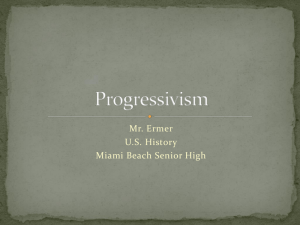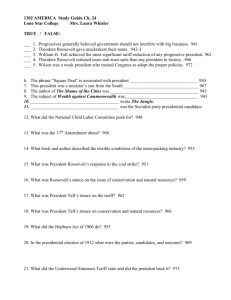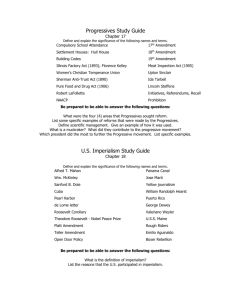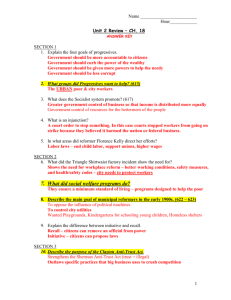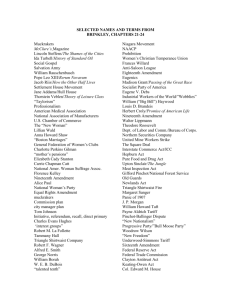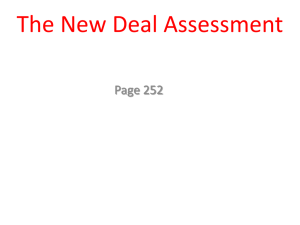Review for Test on Progressives
advertisement
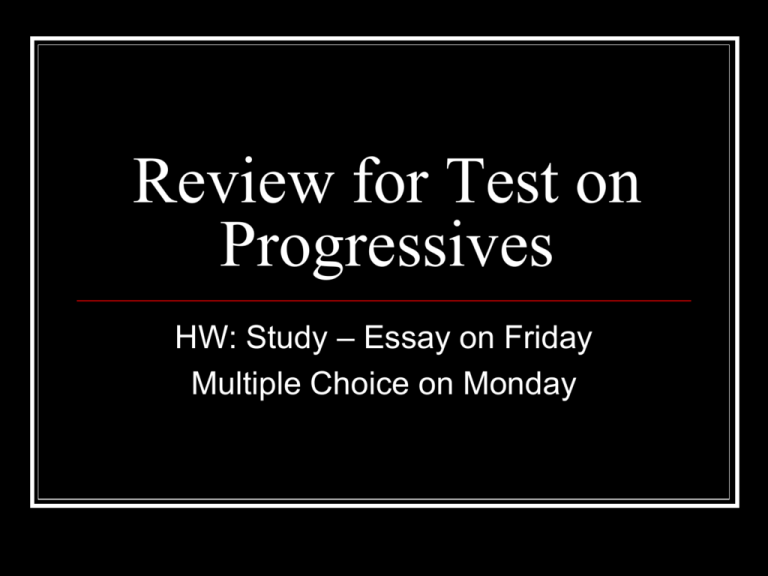
Review for Test on Progressives HW: Study – Essay on Friday Multiple Choice on Monday Goal of the Progressives Strong government could correct abuses and protect rights of the people. Muckraker Journalists who exposed the problems in society as a result of industrialization. Ida Tarbell “History of Standard Oil” Ruthless business practices of Standard Oil Lincoln Steffens “The Shame of the Cities” Urban political corruption Muckrakers Jacob Riis “How the Other Half Lives” Life in New York’s tenements Upton Sinclair “The Jungle” Dangerous conditions in meatpacking industry Identify: William “Boss” Tweed – corrupt political boss – Tammany Hall – stole millions from NY Thomas Nast – cartoonist – drew Tweed Wilson, Roosevelt, and Taft – Progressive Presidents Carrie Nation – leader in Prohibition Identify: Elizabeth Cady Stanton and Susan B. Anthony – suffragists – fought for women’s right to vote. W.E.B. DuBois – fought for equality among African Americans, NAACP – fight actively Booker T. Washington – fought for equality among African Americans, Tuskegee University. Learn a trade work way up to gain economic equality. Define: Initiative: People could suggest legislation Referendum: People would vote on legislation Recall: People could have leaders removed from office Direct Primary - allows voters, rather than party leaders, to select candidates to run for office. Suffragists – campaign for the right to vote Identify: 17th Amendment – Direct election of senators 19th Amendment – Women’s right to vote Good vs. Bad Trusts Bad trusts hurt the consumer Bad trusts do not allow for competition Describe: Pennsylvania Coal Strike: Ask for better pay in Pennsylvania Schools and hospitals run out of coal for heat Owners refuse to negotiate with the miners union Roosevelt threatens to send troops to open the mines. Northern Securities Company Suit brought against big business Roosevelt continued to fight businesses that were hurting the consumers Interstate Commerce Act Set up to stop railroad abuses such as pools and rebates. Hepburn Act Strengthened the ICC Sherman Anti-Trust Act Prohibited monopolies by declaring illegal any business combination or trust. Pure Food and Drug Act Act required food and drug makers to list all ingredients on their packages Tries to end false advertising and the use of impure ingredients. Meat Inspection Act Influenced by The Jungle It forces meat packers to open their doors to federal inspectors. Federal Reserve System To regulate banking. Federal Trade Commission investigate companies to stop using unfair business practices. Essay Reasons for Reform 1) 2) 3) 4) 5) 6) Monopolies restricted competition Labor unrest Unhealthy and unsafe living and working conditions Large numbers of “new Immigrants” crowding the cities Urban poverty, crime, congestion, and poor sanitation Political corruption at all levels of government Who were the Progressives? Americans who wanted to deal with the problems. Many different movements Goals: Abuses of power by government and business could be stopped. Strong government could correct abuses and protect rights of the people. Cities and Settlement Houses An attempt to end the poverty, crowding and disease in American cities. Important info to include: Jacob Riis Settlement house Hull House Jane Addams Temperance and Prohibition Temperance -Opposed the use of alcoholic beverages, began in 1820s Prohibition – outlawing the manufacture and sale of alcoholic beverages. Important info to include: Women’s Christian Temperance Union Carrie A. Nation 18th Amendment Women’s Rights Suffrage for women was the main goal of the feminist movement in the Progressive Era. They felt they could correct various social problems. Important info to include: Elizabeth Cady Stanton Susan B. Anthony Seneca Falls Convention Declaration of Sentiments 19th Amendment Rights of African Americans Decades after Civil War were difficult times for African Americans. Laws prevented them from exercising their rights Jim Crow laws. Booker T. Washington – urged African Americans to learn a vocation to establish themselves economically. W.E.B. DuBois – rejected accommodation – African Americans should protest unfair treatment. Progressivism at State levels State- progressives wanted to limit the power of boss-controlled political machines. Secret ballot Initiative Referendum Recall Direct primary Progressivism at National Level Roosevelt, Taft and Wilson – progressive presidents Roosevelt – Pure Food and Drug Act Meat Inspection Act Square Deal – business regulation, labor conditions, and conservation Trustbuster – Northern Securities Case Strengthen ICC l- Hepburn Act – set railroad rates Labor – Coal Strike Conservation Taft Standard Oil Company – the monopoly had to be dissolved. Mann –Elkins Act – ICC power to regulate telephone and telegraph 16th Amendment – graduated income tax Payne Aldrich Act – set higher tariff rates Wilson New Freedom Lowered tariff Federal Reserve Board – regulate money supply Federal Trade Commission 19th amendment
